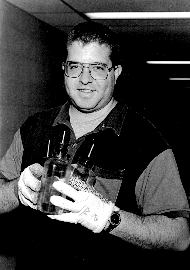|
|
Working WondersSalute: University thanks 4,300 students for a year of jobs well done
Leslie Rice |

When you consider how many students from the schools of Arts and Sciences and Engineering hold campus jobs, you can't help but wonder how the university could possibly function without them. Some 4,300 students have campus jobs, split nearly perfectly in half between undergraduate and graduate students.
"You will find students in every nook and cranny of this institution, from the laboratories to the service divisions to the provost's and president's offices," says D. Lynn O'Neil, director of Student Employment and Payroll Services. "And those numbers don't take into account all the students who work in volunteer programs that serve the campus and community."
Last week was National Student Employment Appreciation Week, and Hopkins celebrated with daily prizes, contests and free food for students who visited the Office of Student Payroll Services. On Thursday, April 9, O'Neil announced the 1998 JHU Student Employee of the Year, an award that went to senior Ed Silverman, a biology major from Banner, Calif. As winner, Silverman receives a $200 savings bond and the opportunity to compete in the state and regional contests sponsored by the National Student Employment Association.

For his work as animal colony manager in a behavioral psychology lab, Ed Silverman, a senior biology major, was named the 1998 JHU Student Employee of the Year. He was nominated by psychology professor Randy Nelson, for whom he has worked for three years. |
Silverman was nominated by psychology professor Randy Nelson, in whose behavioral psychology lab Silverman has worked for three years.
It's unusual, says O'Neil, for faculty members to take the time to fill out the three-page nomination form, which asks about the student's reliability, quality of work, initiative, disposition and contribution. Typically, nominations are submitted by administrative staff.
But Nelson says he felt it was important that Silverman was noticed for his work in his lab as animal colony manager, overseeing both the rodent colonies and the other students who care for them.
"Ed's job is far from glamorous, but because our laboratory studies immune function, it is critical that the animals remain in perfect health," explains Nelson. "Because we have such trust and faith in Ed's ability, we are able to save a significant amount of time that would normally be devoted to evaluating the daily routine of our animal staff. Our research is able to proceed without the concern that the health and well-being of our animals are being neglected."
And it's rare, says Nelson, to find a student who for three years--through exams, papers and other student pressures--has maintained such a positive attitude and a "no-excuse work ethic" as Silverman has.
Silverman says he was touched that Nelson went to the trouble of nominating him, but he does not make much of his own contributions.
"It's a nice place to work; I like the environment, and the people are great," he says. And he says he will be able to carry over what he's learned as a manager into his work as a graduate student at the City of Hope Cancer Research Center in Duarte, Calif.
"I don't really see myself as an overseer or manager," he adds. "It was more of a group thing. The work was doled out equally and everyone worked hard."
Twenty-eight students were nominated for the JHU Student Employee of the Year, and 98 more were honored as groups in departments that couldn't decide on just one student.
But whether nominated or not, all the students who work on campus have a more important purpose than simply keeping the Hopkins engine running smoothly each day, O'Neil says. A student presence enhances any office because it offers campus employers a student perspective they may not otherwise get.
"For example, in our office, it made perfect sense to hire a student to design our student employment Web page," she says. "Our student employees know even better than we do what the other students would need from that Web site."
And, she adds, for those employers who don't work with or serve the students directly, having a student in the office also provides an important reminder of why they are really here in the first place.
| GO TO APRIL 13, 1998 TABLE OF CONTENTS. |
| GO TO THE GAZETTE HOMEPAGE. |